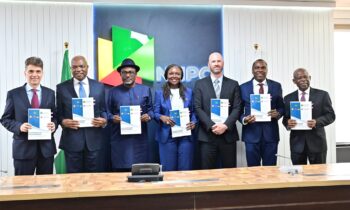…As they sign MOU to reduce contracting cycle

In a move to reduce cost and engender efficiency which will ultimately translate to production growth, increase revenues and improved profitability, major stakeholders in the oil and gas industry on Monday signed a memorandum of understanding (MOU) cum Service Level Agreement (SLA) to reduce the contracting cycle.
The contracting cycle will not be more than 180 days (6months) according to the agreement entered into by the stakeholders.
In other words, the stakeholders are promising to ensure compliance with the provisions of the Nigerian Content Act, and timely approvals of documents.
The long contracting cycle in the Nigerian oil and gas industry has been one of the major snags in the growth of the industry. A project could take as much as three to four years before it eventually takes off the ground from the time of its conception.
Such a situation has led to review of contract prices upward severally because of inflation. Nigeria has on account of the long contracting cycle paid more than double for similar contracts that are executed in another country at far lower prices.
The MoU, which was executed on Monday at the NNPC Towers in Abuja, according to NNPCL was a demonstration of its commitment to the efficiency mandate as enshrined in the Petroleum Industry Act (PIA), which is hinged on developing an industry framework for an optimized contracting cycle.
An optimized contracting cycle is expected to improve the ease of doing business, reduce cost and drive efficiency which will eventually translate to production growth, increased revenues, and ultimately improved profitability. The MoU is also expected to contribute significantly to the double-digit economic growth rate agenda of the Federal Government and generate tremendous value for all the stakeholders which include investors, companies, host communities and the nation at large.
Key benefits of the framework in the MoU include a reduction of the contracting cycle for open competitive tender, selective tender, and single sourcing tender to 180, 178, and 128 working days respectively compared with the current best effort performance of 327, 333, and 185 working days respectively.
Speaking at the MoU signing, the GCEO NNPC Ltd., Mele Kyari said signing the agreement heralds exciting times for the nation’s oil and gas industry and stands as a bold testimony that the Company is plunging into the future of hope, productivity and success. Kyari, who was represented at the occasion by NNPC Ltd’s Executive Vice President, Upstream, Oritsemeyiwa Eyesan, added that with oil and gas as the bedrock of Nigeria’s economy, there is the need to get the contracting process in the Industry right so as to get the economy back on track.
In his remarks, the Executive Secretary, NCDMB, Simbi Wabote, described the MoU signing as a way forward and a critical step towards enhancing the nation’s crude oil production.
He stated that the overall goal is to conclude the oil and gas industry’s tendering to contract award processes within six months, affirming his conviction that the target is realistic with all key parties now on board with the execution of the SLA. He expressed delight that NNPC Limited signed up to the MoU, being the senior partner of the joint ventures and concessionaire of the production sharing contracts (PSC) arrangements that govern the operations of the industry.
Wabote recalled that NCDMB first introduced the 15-day Rule to the industry in 2017, when it promised that it would respond within 15 working days to any formal request for approvals in relation to project execution. He noted that the rule was later formalized with an SLA in May 2017 with Nigeria LNG Ltd pioneering the process and breaking approval records in respect of the NLNG Train7 project.
He added that “the industry found the outcome impressive leading to the Independent Petroleum Producers Group (IPPG) signing the SLA in 2018 and Oil Producers Trade Section (OPTS) thereafter.”
In their various remarks, the IOCs, represented by the MDs/Country Chairs of Shell, ExxonMobil, Chevron, TotalEnergies and ENI all pledged their commitment and support towards the implementation of the MoU for the benefit of all parties.
The framework is in line with the Nigerian Upstream Cost Optimization Program (NUCOP) and in consonance with Mr. President’s directive for NNPC Ltd. and NCDMB to engage the industry with the objective of improving the performance of the petroleum industry.
The development is also in line with the key mandates of NNPC Ltd under the PIA’s Article 53 (7) which empowers it to operate as a commercial entity in a profitable and efficient manner, as the National Energy Company.
The mandate for efficiency requires that NNPC Ltd. is committed to working with its partners in ensuring key processes, procedures, and timelines that drive major business activities such as contracting, are structured in a manner that engenders efficiency and drives profitability.





